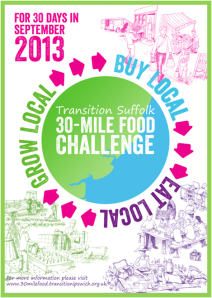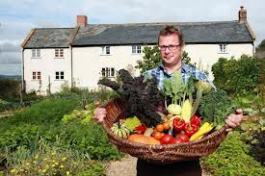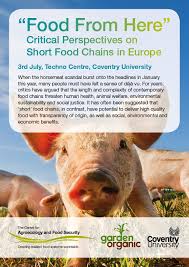It’s been over a week since the Suffolk Local food Challenge began and it feels like it’s received quite a lot of interest from the local media. My home hosted BBC Radio Suffolk for a local breakfast on the last Friday in August just before the challenge began, despite being given short notice I found that most of the ingredients needed for a decent cooked breakfast were already in my larder. Although I’m one year into a PhD in local food and have long been interested in where my food has come from I haven’t really been sourcing that locally for that long. When I found that I had most of the ingredients to hand for a thirty mile breakfast without even thinking about it the realisation dawned on me that my food sourcing had become overwhelmingly local since I’d embarked in last year’s local food challenge which had mad me not only think about my shopping habits but challenged me to act on those thoughts.
Breakfast with the local radio was followed up by a 2 page spread in yesterday’s East Anglian Daily Times all about the challenge and it’s launch on the 1st of September. It seems people (apart from myself and other local food types were keen to promote local food). The reality of the challenge though will be much harder for many others to swallow. It would be disingenuous to say that buying local is easy, put simply it isn’t. You not only have to think about what you’re buying, you also need to plan where you buy it from, a trip to Sainsburys or Tescos will see you walking out with some fairly light bags if you’re buying exclusively local. However as a veteran of last years challenge I would say sourcing locally is easier than you think and also cheaper than you think. Possibly the hardest part is actually making the decision to do it in the first place, once you have you simply plan your food shopping (and or food growing) accordingly. The temptation of convenient and cheap food is difficult for all of us to ignore and we are far removed from the consequences, be they on the land, poorly paid workers or our own health. The gap that exists between most of us and our food is not just geographical but cognitive.
A common response to health problems associated with diet is that people need to be better educated about food but the causes relate to circumstance not just our ability to understand food. Two snippets of last nights TV underlined this point nicely. First of all Jamie’s Money Saving Meals which tries to help us save money by using the food which gets thrown away. The rationale is obvious: If people had a greater knowledge of food they might be more capable of thinking of eight different ways to use that half a cabbage festering at the back of the fridge. True but have we really become any less educated about how to prepare food, popular media is swamped with articles and information about food and if that’s not inspiration enough we can have a recipe on our computer screen for almost anything in thirty seconds. This makes you wonder whether it’s a lack of cooking skill that’s to blame or unbelievably cheap food, throwing away half a cabbage might not be such an easy option if you’d just spent a more substantial chunk of your weekly budget on it. The wider consequences of squeezing prices down in an effort to encourage consumption were highlighted by Robert Peston goes shopping. The rise of Primark as a highstreet giant largely driven by price was a focus of the programme, as one shopper observed if you only pay £5 for an item of clothing then you don’t feel so bad about throwing it away if you’ve only worn it twice. So what are the consequences and who’s to blame the consumer for buying such low cost goods or the retailer for selling them? Well ultimately we’re all complicit and unfortunately we’ll all pay the price, unless we decide we’re not so sure we’re getting good value for money after all!




